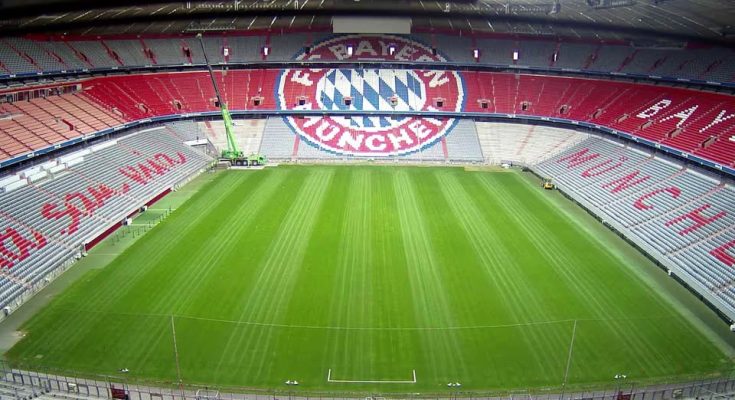Bayern Munich has never been a club that settles for ordinary. For decades, the German powerhouse has been defined by ambition — on the pitch, in its management, and in the way it envisions the future of football. This week, that ambition reached new heights as the club officially unveiled a breathtaking $680 million redevelopment plan for the iconic Allianz Arena, a project that promises to transform one of football’s most recognizable stadiums into a world-class, eco-friendly, and technologically advanced masterpiece.
The announcement sent ripples through the football world, not merely because of its staggering financial scope, but because of the vision that drives it. Bayern Munich isn’t just upgrading a stadium; it is redefining the concept of what a football arena can and should be in the 21st century. The Allianz Arena — already celebrated for its mesmerizing exterior, capable of glowing in red, blue, or white — will soon be reborn as a symbol of innovation, sustainability, and unmatched fan experience. For Bayern, this is not simply a construction project; it’s a declaration that the club’s future will be as bold and brilliant as its illustrious past.
The redevelopment will include an expanded seating capacity, increasing from approximately 75,000 to nearly 85,000, ensuring more fans can witness the Bavarian magic live. Yet, the project is not only about numbers — it’s about connection. Bayern Munich aims to bring fans closer to the action, both physically and emotionally, through architectural and digital ingenuity. The new seating configuration will include improved sightlines, wider concourses, and state-of-the-art accessibility features designed to make every matchday inclusive and comfortable for all.
From the first sketches unveiled by the club, it’s evident that Bayern’s leadership envisions more than a venue for football. The new Allianz Arena will be a living, breathing ecosystem that embodies the essence of the modern game — dynamic, sustainable, and globally connected. Club president Herbert Hainer called it “a project that will stand as a beacon of progress not only for Bayern Munich but for football as a whole.” According to Hainer, the redevelopment is expected to begin in 2026 and conclude by 2029, ensuring minimal disruption to home matches while gradually unveiling new sections of the stadium as construction progresses.
What makes this project truly groundbreaking, however, is its commitment to sustainability. Bayern Munich has long been one of the leading voices in European sports for environmental responsibility, and the new Allianz Arena will push those efforts into a new era. The redevelopment includes plans for a fully carbon-neutral energy system powered by solar and geothermal technologies. The stadium’s new roof design will integrate solar panels capable of generating enough energy to power the entire facility on matchdays, while excess energy will be fed back into Munich’s city grid.
Additionally, the club is partnering with several leading environmental technology firms to develop advanced water recycling systems and intelligent climate control, significantly reducing the arena’s carbon footprint. Even the construction materials will reflect the club’s green ethos, as Bayern plans to use sustainable concrete alternatives and recycled metals throughout the structure. The goal is not just to build a football venue, but to set a benchmark for future stadium projects worldwide — a model of environmental stewardship fused with architectural excellence.
Equally compelling is Bayern’s commitment to the fans — the heartbeat of the club. The new Allianz Arena promises to deliver a fan experience that bridges tradition and technology in ways no other stadium has attempted before. Plans include immersive “fan zones” equipped with augmented reality experiences, interactive club history galleries, and AI-powered personalization tools that will allow supporters to tailor their matchday journey.
Imagine entering the stadium and having your Bayern membership app guide you to your seat, suggest nearby dining options, and even display real-time stats on your favorite players as you watch from the stands. That’s the level of innovation Bayern Munich is pursuing — an experience where every fan feels individually connected to the game, the team, and the history that defines the club.
Furthermore, Bayern intends to strengthen the bond between players and supporters by creating new spaces for interaction. The updated arena design will feature a “Bayern Hub,” an area combining training facilities, fan lounges, and community spaces, allowing fans to see the players train and even participate in post-match events. This reflects Bayern’s longstanding commitment to accessibility and transparency — values deeply embedded in the club’s DNA since its founding in 1900.
From an economic standpoint, the redevelopment is expected to deliver enormous benefits to Munich and the broader Bavarian region. According to early projections, the construction phase alone will create over 3,000 jobs, while the completed project is expected to generate millions annually in tourism, hospitality, and local commerce. The Allianz Arena has already been a magnet for visitors from around the globe, drawing more than 3 million people per year. The new, expanded version promises to elevate those numbers further, cementing Munich’s place as one of Europe’s premier sports destinations.
Football analysts have also praised the strategic timing of the project. With Germany set to remain a central hub for major football tournaments and events in the coming decade, Bayern’s modernization of the Allianz Arena positions the club to host global spectacles — from UEFA Champions League finals to potential World Cup matches — with unparalleled flair. The stadium’s upgraded facilities will meet or exceed all international standards for hosting elite events, giving Bayern Munich both prestige and practical advantage in the years ahead.
Bayern’s leadership has made it clear that this redevelopment is as much about legacy as it is about luxury. As CEO Jan-Christian Dreesen explained during the unveiling, “We are not just building for today — we are building for the next generation of Bayern supporters. Our goal is to create an arena that our children and grandchildren will be proud of, one that represents the values of Bayern Munich: excellence, unity, and progress.” That sentiment captures the spirit of the project — a belief that football is not static but evolving, and Bayern intends to lead that evolution.
Beyond the technical details and the architectural brilliance, there’s something deeply emotional about this announcement. The Allianz Arena has been the home of countless memories — roaring victories, heartbreaking defeats, and moments of pure footballing artistry. Now, as it prepares for a new chapter, it carries the promise of even greater stories to come. The redevelopment is not a departure from the past but an expansion of it — an evolution that honors the legacy of legends like Philipp Lahm, Bastian Schweinsteiger, and Franck Ribéry, while paving the way for the stars of tomorrow.
In many ways, Bayern’s decision reflects the club’s fundamental philosophy: constant reinvention. Just as they dominate on the pitch by adapting and innovating, they are doing the same with their infrastructure. While other clubs may chase glamour projects for short-term headlines, Bayern’s focus is always on sustainability — in results, in finances, and in culture. This project encapsulates that ethos perfectly: ambitious yet grounded, modern yet timeless.
The emotional response from fans has been overwhelmingly positive. Supporters’ groups from across Germany and beyond have celebrated the announcement, seeing it as proof that the club continues to think big while staying true to its roots. For many, it’s a reaffirmation of Bayern Munich’s identity — a club that belongs to its people, constantly evolving but never losing sight of who it is.



